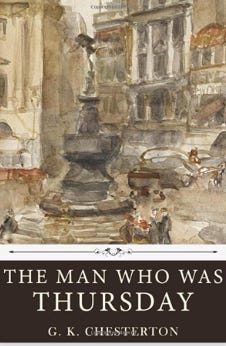G.K. Chesterton Captured the Paradox of the New Left in a Single Literary Passage
'The Man Who Was Thursday' explored the paradox of nihilism and pessimism of postmodernism in colorful fashion.
The great English writer G.K. Chesterton (1874-1936) was a philosopher renowned for his wit and paradoxical statements. He wrote extensively on a range of topics, from philosophy to literature and politics. His works are still widely read today and his influence on modern thought is undeniable.
Chesterton famously used paradoxes to make his points, much like Oscar Wilde. Both men believed that by presenting two seemingly contradictory ideas at the same time, one could get people to think more deeply about important issues. Although this approach has been adopted by many writers since, Chesterton and Wilde remain unmatched in the literary skill of using paradox to unveil truth (though Chesterton managed to do so with less cynicism).
My favorite Chesterton novel remains The Man Who Was Thursday, a thrilling and thought-provoking story that follows Gabriel Syme, a poet and undercover detective tasked with infiltrating an anarchist organization in London. Syme soon discovers that the anarchists are not what they appear to be, and he soon finds himself embroiled in a mysterious conspiracy of international and apocalyptic proportions.
It’s important to understand that when Chesterton explores anarchy, he is talking primarily of philosophical anarchy, not political anarchy. Originally written and published in 1908, Thursday explores the nihilism and pessimism of postmodernism that had crept into Western thought and would ultimately lead to World War I, Western civilization’s first attempt at collective suicide.
Early in the book, we learn that Syme is rebelling against postmodernism; it’s an act, as Chesterton puts it, of “rebellion against rebellion.” But this rebellion was not as simple as it might appear. Syme, we learn, is revolting against two seemingly paradoxical postmodern forces—one which sees everything permissible and one which seeks to enthusiastically enforce moral dogmas.
These are not abstract forces for Syme. He grew up, we learn, among “a family of cranks, in which all the oldest people had all the newest notions.”
In a single exquisite passage, Chesterton uses Syme’s parents to personify these paradoxical postmodern philosophies.
“His father cultivated art and self-realisation; his mother went in for simplicity and hygiene. Hence the child, during his tenderer years, was wholly unacquainted with any drink between the extremes of cocoa and absinth, of both of which he had a healthy dislike. The more his mother preached a more Puritan abstinence the more did his father expand in a more than pagan latitude; and by the time the former had come to enforcing vegetarianism, the latter had pretty well reached the point of defending cannibalism.”
Chesterton captures here, rather poetically and hilariously, the paradox of postmodern philosophy. On one hand, it rejects the very idea of objective truth, which they see merely as a set of personal preferences. On the other, it seeks to overturn the current order of things and to replace it with a new (and supposedly superior) moral code.
We see evidence of the philosophical anarchy Chesterton was writing about more than a century ago all around us today. We see it when we’re told we must advance women’s rights, even though we cannot define what a woman is.
What do we do in such a world? For Gabriel Syme, the answer was simple.
“Being surrounded with every conceivable kind of revolt since infancy, Gabriel had to revolt into something,” Chesterton wrote, “so he revolted into the only thing left: sanity.”





Interesting, unusual, and good choice with G.K., paradoxically yours; thanks, well done Jon.
Your post got me to explore him a little: 12,000+ pages in his Delphi Complete Works!
A true, eccentric, British fruitcake with many calories of understanding—a physical body like Thomas Wolfe as big as his opus!
Good quotes from his novel, well aimed at the postmodern nonsense (“A House Built on Sand--Exposing Postmodernist Myths About Science” Edited by Noretta Koertge)
Also, an early critic of Eugenics, although he toyed with joining the Fabians and remained friends with Eugenicist Shaw.
As a Voluntaryist (Aka, Anarchist etymologically defined as No Rulers)—and you as a “Christian Libertarian”—I wonder what you make of his writing for the British “War Propaganda Bureau” such war mongering pieces as “The Barbarism of Berlin”?
Whatever, I get the sense G.K. was an equal opportunity offender as I am, and would never join any club, along with Groucho and me, that would have us.
Here is interesting account of him on YouTube: The Outline of Sanity, Thom Willis
https://www.youtube.com/watch?v=f1o7Q7Zj4tg
A wise quote of his I pass on often: “The way to love anything is to realize that it might be lost.”
Keep safe and free of rulers.
I think Chesterton was taking aim at people and outfits like the Fabians, Theosophy (Blavatsky), Rudolf Steiner and so on. These would be considered ‘modern’ in a broad sense. Postmodernism is a post-WW2 development that took aim at their various certainties.